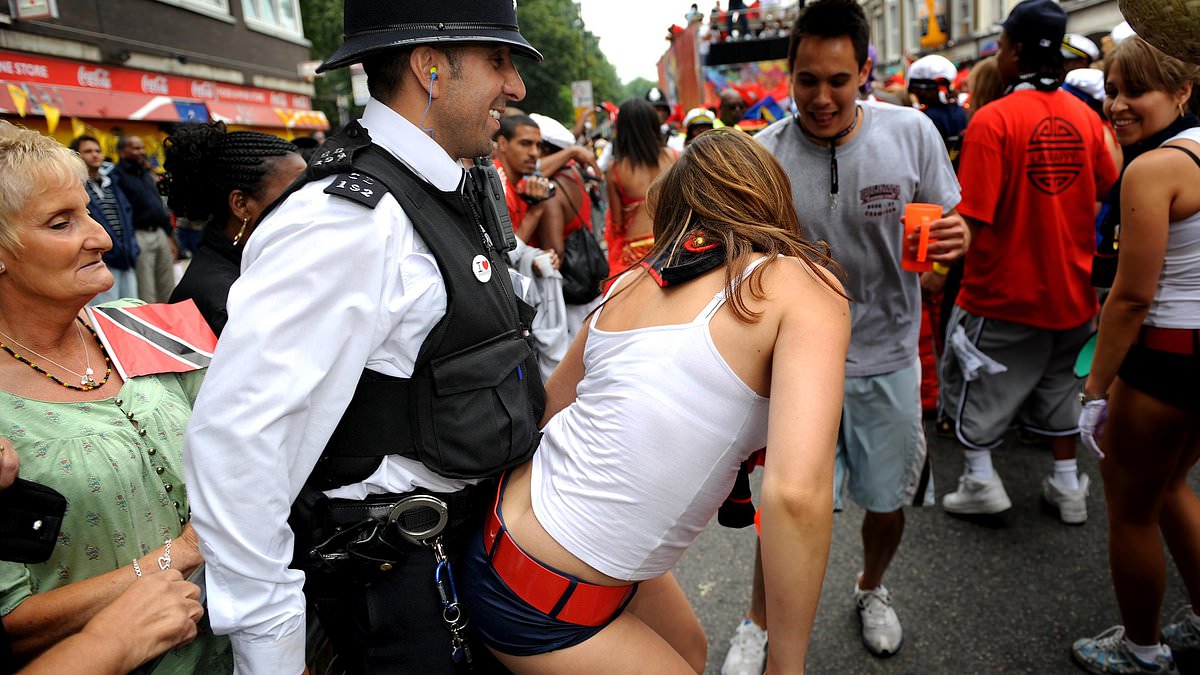Officers policing Notting Hill Carnival have been ordered not to dance with revellers for fear of looking ’embarrassing’, following allegations of two-tier policing.
Met Police said officers at this year’s event have been instructed to be ‘friendly’ while retaining ‘high standards of behaviour’ — which did not include dancing.
‘Officers were briefed to be vigilant, purposeful and friendly at all times,’ a spokesperson for Met Police told .
‘They were asked to police in the spirit of the community celebrations while remaining professional, being engaging without being embarrassing.
‘They were told that high standards of behaviour and appearance were expected and that dancing or other antics were not in line with that.’
Police officers enjoying the party atmosphere at Notting Hill has become a regular sight at the event in recent years, with some taking part in group dances and showing off their best moves.
But police have also received backlash in recent years and were even threatened with a ‘dancing ban’ back in 2019, to enable them to ‘keep a better eye on what’s going on around them’.
Just this weekend, ex-inspector Mike Neville claimed that Notting Hill Carnival was the ‘ultimate in two-tier policing’ and alleged officers were hesitant to make arrests for fears of being called racist.
The former Met Police detective said if the behaviour previously seen at the Carnival as repeated at events such as football matches, ‘it would be banned’.
Scotland Yard rejected claims that it applies two-tier policing at the event.
Notting Hill is one of the longest-running street parties in the UK and celebrates Caribbean culture with vividly costumed performers taking part in a parade through the streets with dancing and music.
One million people are estimated to attend the event each August Bank Holiday weekend. But carnivals in the past have also been marred by violence.
In 2023, Met Police reported eight stabbings and 275 arrests, while this year there has been three reported stabbings and 249 arrests, as well as 18 officers assaulted.
A 32-year-old woman was stabbed at the carnival yesterday while enjoying a ‘family day’ with her young child. She remains in critical condition, while a 29-year-old man is also in hospital with non-life threatening injuries.
A 24-year-old man who was also left with non-life threatening injuries after being stabbed during Sunday’s parade has discharged himself from hospital.
There have been no arrests in relation to the three attacks yet.
Ahead of the main parade on Monday, Deputy Assistant Commissioner Ade Adelekan said the first day of the 2024 Carnival had been ‘marred by violence’.
She said: ‘Yesterday we saw the first day of Carnival marred by unacceptable violence. Three people were stabbed and we only very narrowly avoided a fatality.
‘This was supposed to be ‘family day’ – a celebration suitable for all ages. One of those in hospital, a 32-year-old woman whose condition remains critical, was at Carnival with her young child.
‘We are tired of saying the same words every year. We are tired of telling families that their loved ones are seriously injured, or worse. We are tired of seeing crime scenes at Carnival.
‘Carnival is a community event and the vast majority of people come to celebrate, to dance, to enjoy music and have a fantastic experience.
‘It is the responsibility of all who value this event, who want to see it as the celebration it should be, to speak out and speak up about the violence that continues to overshadow it.’
Further arrests were made for sexual offences, drugs, robberies and a range of other crimes.
A Section 60 order, otherwise known as stop and search, was also authorised for the Carnival area from 6.05pm to 2am as part of an intensive police operation. This gives officers greater powers to search suspects and remove weapons from the streets.
Around 7,000 officers were deployed to police the event across the bank holiday weekend.
Commander Chairman Brenyah previously told the Telegraph that the force has search powers that will use to take weapons off the street and intervene with anyone committing violence.
Commander Brenyah did admit that the sheer weight of numbers attending presents a potential danger and is a ‘serious cause for concern.’
Businesses and residents boarded up their properties in preparation for the carnival.
In 2019, police officers faced a dancing ban as superintendent Elisabeth Chapple told officers working to keep festivalgoers safe, to ‘remember what they are there for’.
She said at the time: ‘Our officers are there to keep people safe. If they are dancing and getting involved then they are less able to keep an eye on what’s going on.’
But Matthew Phillip, the carnival’s executive director, said at the time he wasn’t worried about police joining in with the day’s music and showing their moves.
He said: ‘Carnival is a cultural event – it’s not a demonstration or something that needs to be policed in a forceful, strict manner. I think it’s good that the police engage with the public rather than just standing there.’
In the years since the carnival began in 1966 police men and women have often embraced the atmosphere at the event while ensuring order is maintained.
While some offices preferred to just sway their arms as the procession happened, others have really shown their party moves and embraced dancing with the cheerful public.
The Labour Party described the event – which was first held in the 1960s – as a ‘vibrant celebration of Caribbean culture and black history through music, art and dance’ in a social media post on Saturday.
